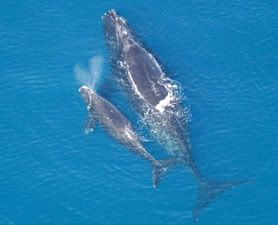
photo credit Discovery News via NOAA
What is noise pollution? Some people find this a confusing concept. How can noise pollute? It's simple, really. Noise pollution is the excess of noise - and loud noise at that. Sounds that could be considered noise pollution are helicopters, highway traffic and your teenage neighbor's garage band. Under water, sounds that could be considered noise pollution are shipping traffic, heavy machinery used in tasks such as dredging or commercial fishing, and navy sonar exercises. Since water is a greater conductor of sound than air, the noises are louder for longer, and travel over greater distances.
Why does this matter? Why is this bad? Because whales and other marine mammals use sound as primary communication. In order to be heard over the noise, whales have been making louder calls to each other.
"One downside is that "shouting," as for humans and other animals, requires more energy expenditure and probable strain, so we are making life more difficult for these already at risk marine mammals. Since communication is tied to mating, feeding and more, these critical aspects of whale life may also be impacted."
The study took place under moderate noise pollution conditions, where ships were anywhere from 62 to over 621 miles away. But what happens if the noise is closer, and louder?
Susan Parks, research associate at Pennsylvania State University's Environmental Acoustics Program suggests "Whales may stop calling all together when the noise levels increase."
Then what?
Full article here (Discovery News)
No comments:
Post a Comment